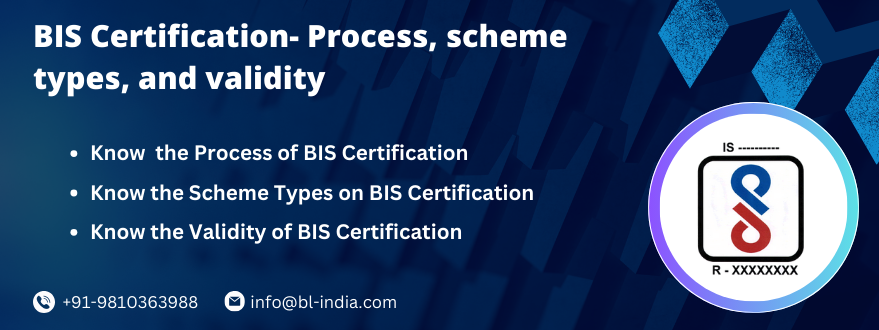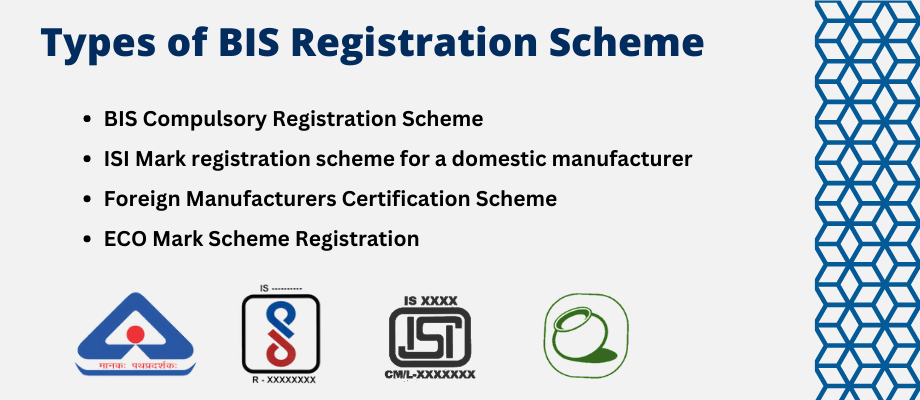
BIS certification is issued by the Bureau of Indian Standards (BIS) in India, serving as a symbol of assurance to customers regarding product quality, reliability, and safety. BIS takes on multiple responsibilities, including product certification, standards formulation, testing, hallmarking, calibration schemes, and more.
When it comes to product certification, BIS follows a voluntary approach, allowing manufacturers to opt for certification voluntarily. However, the Government of India has recognized the significance of public health and safety, and as a result, has mandated BIS certification for certain products. Currently, 380 products fall under this mandatory certification requirement. Acquiring the BIS certification grants license holders the privilege of affixing the prestigious ISI mark (‘standard mark’) on their products, a symbol synonymous with quality in the eyes of consumers.
Bureau of Indian Standards (BIS)
The BIS, as the national standards body of India, plays a pivotal role in promoting and regulating the standards of products and goods across various industries. To ensure the quality and safety of products, the BIS has established eight Central, four regional, and three branch laboratories throughout India. These laboratories conduct rigorous testing of product samples during preliminary assessments and continuous surveillance operations, adding an extra layer of confidence in the certification process.
While the BIS certification for products remains voluntary, the government strongly encourages its adoption for several essential purposes:
BIS Certification benefits:-
Types of BIS Registration Schemes:-
Listed below are the different types of schemes under which the BIS certification is provided for the products:

BIS Compulsory Registration Scheme (CRS):-
The Ministry of Electronics and Information Technology (MeitY) introduced the Compulsory Registration Scheme (CRS) by enacting the 'Electronics and Information Technology Goods (Requirement for Compulsory Registration) Order, 2012.' This initial order encompassed 15 categories of electronics items, setting the foundation for a robust quality assurance framework. As part of a dynamic regulatory evolution, the CRS scope expanded to include additional electronic and information technology goods, magnifying its impact.
The CRS mandates that manufacturers of products listed under its purview obtain mandatory BIS certification. Under the 2012 MeitY order, goods must adhere to Indian Standards specified in the order and bear the standard mark, coupled with a unique BIS registration number. This imperative ensures that products conform to established quality benchmarks and instills consumer confidence.
Manufacturers seeking BIS certification within the CRS framework are granted the license to use the standard mark alongside a distinctive R-number. The BIS certification process, facilitated through smart registration, entails manufacturers filing Form-I, accompanied by a self-declaration of conformity for each product.
Crucially, manufacturers must procure test reports for their products from BIS-recognized laboratories. These verified reports, along with an undertaking of conformity and an affidavit, are submitted to the BIS, affirming the product's adherence to prescribed standards.
The culmination of this process rests on a meticulous evaluation by the BIS. By assessing the applicant's manufacturing infrastructure, test results, and continuous commitment to quality, the BIS extends the coveted BIS certification under the CRS. This robust framework bolsters consumer trust, strengthens product standards, and contributes to the creation of a safer and more reliable marketplace.
BIS/CRS Registration Process:-
The process for obtaining BIS CRS (Compulsory Registration Scheme) Registration involves several key steps, ensuring compliance with the mandatory standards for specific products. Here's a step-by-step guide to the registration procedure:
Product Identification: Initially, you need to identify your product and determine its corresponding Indian Standard (IS) number, as specified in the table provided above. Understanding the relevant IS number is crucial for the registration process.
Sample Testing: You are required to provide a representative sample of your product to a BIS-certified laboratory for testing. The laboratory conducts comprehensive tests to assess whether your product meets the prescribed safety and quality standards.
Application Submission: Once you have obtained the test reports and gathered all the necessary documents, the application for BIS CRS registration is filed. The application is submitted along with the relevant supporting documents and the test reports generated during Step 2.
Application Examination: The Bureau of Indian Standards examines the application and thoroughly reviews the submitted documents. This meticulous scrutiny ensures that all the information provided is accurate, complete, and in accordance with the regulatory requirements.
CRS Registration Certificate: After a thorough evaluation of the application and documents, if BIS is fully satisfied with your product's compliance, they will issue the BIS CRS Registration Certificate. This certificate signifies that your product has successfully met the mandatory standards and is eligible for sale in the Indian market.
ISI Mark Scheme Registration for Domestic Manufacturers:-
The ISI Mark Registration Scheme for Domestic Manufacturers is a process that allows manufacturers in India to obtain the ISI mark for their products. The ISI mark is a certification mark that indicates that a product meets the Bureau of Indian Standards (BIS) requirements.
The ISI Mark Registration Scheme is divided into two parts:
Scheme I: This scheme is for products that are subject to compulsory certification under the BIS Act, 2016.
Scheme II: This scheme is for products that are not subject to compulsory certification under the BIS Act, 2016, but that manufacturers may choose to have certified.
The requirements for obtaining the ISI mark under Scheme I are more stringent than those for Scheme II. However, the benefits of obtaining the ISI mark under Scheme I are also greater.
To obtain the ISI mark, manufacturers must first apply to the BIS. The application process includes submitting documentation that demonstrates that the manufacturer's products meet the relevant BIS standards. The BIS will then inspect the manufacturer's facility to verify that the products are being manufactured in accordance with the BIS standards.
If the manufacturer's products meet the BIS standards and the manufacturer's facility passes the inspection, the BIS will issue the manufacturer an ISI certificate. The ISI certificate is valid for a period of five years.
If you are a manufacturer in India and you are interested in obtaining the ISI mark for your products, you can find more information on the BIS website.
Here are some of the steps involved in the ISI Mark Registration Scheme for Domestic Manufacturers:
Select the product code. The first step is to select the product code for the product you want to register. The product code can be found on the BIS website.
Fill out the application form. The next step is to fill out the application form for the ISI Mark Scheme Registration. The application form can be found on our website.
Submit the application form and documentation. Once you have filled out the application form, you need to submit it along with the required documentation to the BIS. The required documentation includes:
Undergo an inspection. Once your application and documentation have been reviewed, a BIS inspector will visit your facility to conduct an inspection. The inspector will verify that your manufacturing processes and quality control procedures meet BIS standards.
Receive the ISI certificate. If your facility passes the inspection, you will be issued an ISI certificate. This certificate will allow you to mark your products with the ISI mark, which indicates that they meet BIS standards.
The ISI Mark Registration Scheme for Domestic Manufacturers is a valuable process that can help manufacturers in India to improve the quality of their products and increase their marketability.
Foreign Manufacturers Certification Scheme (FMCS):-
The Bureau of Indian Standards (BIS) runs the Foreign Manufacturers Certification Scheme (FMCS), a scheme that allows foreign manufacturers to obtain a BIS certificate for their products. The BIS certificate allows foreign manufacturers to mark their products with the ISI mark, which indicates that they meet the relevant BIS standards.
The scope of the FMCS encompasses all articles except for those that have received notification from the Ministry of Electronics and Information Technology (MeitY). The management of the program is overseen by the Foreign Manufacturers Certification Department (FMCD), which is situated at the BIS headquarters in New Delhi.
To obtain a BIS certificate under the FMCS, foreign manufacturers must first apply to the FMCD. The application process includes submitting documentation that demonstrates that the manufacturer's products meet the relevant BIS standards. The FMCD will then inspect the manufacturer's facility to verify that the products are being manufactured in accordance with the BIS standards.
If the manufacturer's products meet the BIS standards and the manufacturer's facility passes the inspection, the FMCD will issue the manufacturer a BIS certificate. The BIS certificate is valid for a period of five years.
ECO Mark Scheme Registration:-
The ECO Mark Scheme is a voluntary certification scheme for environmentally friendly products and services in India. The scheme is implemented by the Bureau of Indian Standards (BIS).
To obtain the ECO Mark, manufacturers must first apply to the BIS. The application process includes submitting documentation that demonstrates that the manufacturer's products meet the relevant environmental standards. The BIS will then inspect the manufacturer's facility to verify that the products are being manufactured in accordance with the environmental standards.
If the manufacturer's products meet the environmental standards and the manufacturer's facility passes the inspection, the BIS will issue the manufacturer an ECO Mark certificate. The ECO Mark certificate is valid for a period of three years.
There are a number of benefits to obtaining the ECO Mark for a product. The ECO Mark indicates to consumers that the product has been tested and meets the relevant environmental standards. This can help to increase customer confidence in the product and improve its marketability. The ECO Mark can also help to protect consumers from counterfeit products.
Validity of BIS Certification:-
The validity of BIS certification depends on the product or service that is being certified. For most products, the BIS certificate is valid for a period of five years. However, there are some products that have a shorter validity period, such as electrical appliances, which have a validity period of two years.
The BIS certificate can be renewed for a further period of five years, provided that the product or service continues to meet the relevant BIS standards. The renewal process is similar to the initial certification process, and the fees are also similar.
If a product or service is no longer being manufactured or supplied, the BIS certificate will no longer be valid. The manufacturer or supplier is responsible for ensuring that the BIS certificate is removed from the product or service.
The BIS certificate is a valuable asset for manufacturers and suppliers. It can help to increase customer confidence, improve marketability, and comply with government regulations.
If you are a manufacturer or supplier of products or services in India, you should consider obtaining a BIS certificate. The BIS certificate is a valuable asset that can help you to improve your business.
Conclusion:-
BIS certification is more than just a mark it epitomizes the collective effort towards elevating quality standards and instilling consumer trust. With each ISI mark, BIS reinforces its dedication to a marketplace where excellence thrives, protecting consumers from substandard products and driving businesses to new heights of success. As industries evolve, BIS certification remains a steadfast pillar, empowering manufacturers to improve their products, enhance marketability, and ultimately contribute to a safer and more reliable marketplace for all.